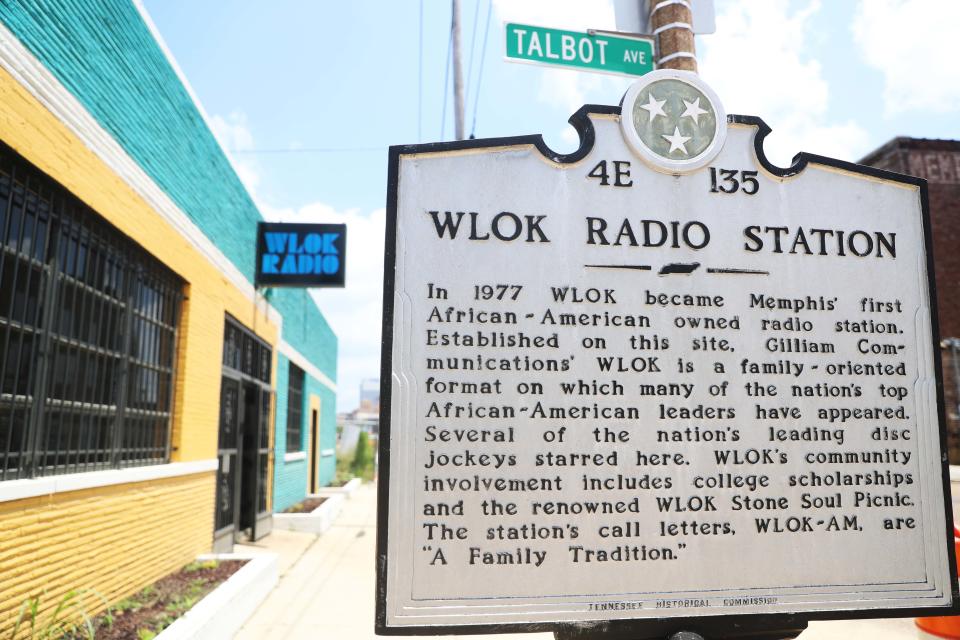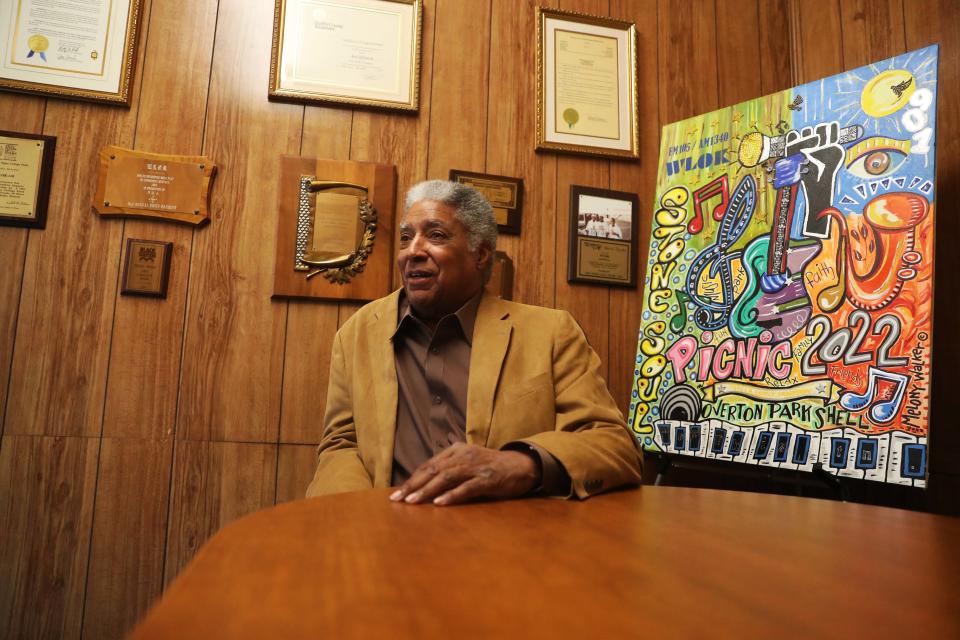The WLOK gospel truth: Memphis radio legend Art Gilliam a hall-of-famer

One expects the walls of a radio station to be embellished with posters of recording artists, zany deejay promotions and other tokens of pop cultural impact, commercial success and brand identity.
But the offices and rabbit warren-like corridors inside the modest headquarters of WLOK radio at 363 South Second Street mostly eschew such ephemera. The walls are covered with framed Congressional resolutions, plaques from civil rights organizations and other honors. A conference room contains photographs of slave cabins. The motivating texts are historical documents, law books and the Bible, not the Billboard charts.
When Art Gilliam and his investors purchased WLOK in 1977, "We came in and looked around, and the walls were covered with gold records," he said. Gilliam transformed the station into a ratings powerhouse, but his purpose, he said, went beyond sharing R&B hits with listeners. The first Black owner of a radio station in Memphis, Gilliam crafted an official mission statement that promised "a full, uncompromising commitment to serve at all times as a progressive force representing the hopes and aspirations of black people," with "a special concern for the needs, interests and advancement of the black community of Memphis."
The station's format has changed (WLOK now focuses on gospel music instead of R&B) and its reach has expanded (its broadcasts now can be found at FM 105 in addition to its historic home at AM 1340). But its mission remains the same, as does its tall and elegant majority owner, president and CEO.
Gilliam celebrated his 80th birthday on March 6, but he arrives at the squat WLOK building — located, appropriately enough, just north of the National Civil Rights Museum — at 8:30 a.m. Monday through Friday. He does not leave most days until late afternoon.

"He comes in every day — every day," marvels Chip Washington, host of the hourlong "Let's Talk About It" call-in show that broadcasts live at 10 a.m. each weekday. "That's legendary, right there. This is a man who has given his whole life to this community. Just being in the same building is an honor."
Apparently, many of Gilliam's industry peers and even competitors feel the same way. On July 29, in a ceremony in Columbia, Tennessee, Gilliam will be inducted into the Tennessee Radio Hall of Fame, along with Nashville country music songwriter and broadcaster Devon O'Day; longtime deejay Al "Adams" Johnson of Knoxville, who was known for his wild-and-crazy nighttime antics; and rock 'n roll radio pioneer Johnny Eagle of Chattanooga. The 2023 Hall of Fame inductees also includes a "legacy class" featuring the late Sam Phillips, founder of Memphis' Sun Records.
For Gilliam, the recognition is, if anything, overdue.
“His purchase of that station as a Black voice at a critical time of history in Black America speaks to his importance,” said the Rev. Kevin Andre Brooks, 51, pastor of Providence AME Church and host of the Rainbow/PUSH Hour, a program that celebrates Black activism that is heard at 6 p.m. Sundays on WLOK. (Originated by the late Rev. Samuel "Billy" Kyles, the civil rights leader who was the longtime chief of the local chapter of the Rev. Jesse Jackson's Operation PUSH organization, the Rainbow/PUSH Hour has been on the air for nearly 50 years.)
“Sometimes you need a platform for the town crier and all the town criers,” Brooks said. “In the history of Black folks organizing to be recognized as full citizens in this country, the Black media, the Black newspapers and Black radio, have been essential for validating the voices of folks who feel disinherited, disrespected and disenfranchised. WLOK has been crucial to that.”

Gilliam is "a groundbreaking guy,” said James Alexander of the Bar-Kays, the Memphis R&B/funk ensemble that next years celebrates its 60th anniversary and that was a participant in some of WLOK’s earliest “Stone Soul Picnic” concerts. “We talk about diversity all the time, but he is the only African-American that owns a radio station in the city of Memphis. That’s monumental.”
As a rare locally owned station in an increasingly corporate and homogeneous radio landscape, "We consider ourselves a community radio station," Gilliam said. "There's no question that we have a message."
Gilliam's influence as a Black voice in a sometimes resistant media landscape goes beyond radio. He also was the first Black columnist at The Commercial Appeal, and the first Black on-air reporter at WMC-TV Channel 5.

Herman Arthur Gilliam Jr. was born in Nashville but moved to Memphis at age 6. His family was relatively prosperous: His father was an executive at Memphis-based Universal Life Insurance, which made history as one of the first major Black-owned companies in the U.S., and his mother, Leola Gilliam, was a schoolteacher. His childhood playmates and friends included Booker T. Jones, Isaac Hayes and other soul innovators whose music would find a home on WLOK and on radio stations around the world.
Gilliam attended Hamilton High School, but his education-oriented parents eventually sent him to Westminster School, a prep boarding school in Simsbury, Connecticut. He later earned business degrees at Yale University and the University of Michigan, and then joined his father at Universal Life, where a bright future in the insurance business seemed assured.
But Gilliam had ideas he wanted to communicate beyond those in his actuarial tables.
When Dr. Martin Luther King Jr. was murdered in Memphis in 1968, Gilliam approached The Commercial Appeal, with a desire to write columns for the editorial pages that would provide some Black perspective to the news of the day. The timing was right, because the newspaper was facing pressure and even the threat of a boycott from Black leaders who were angry over what they said was biased, even racist coverage of the sanitation strike that brought King to Memphis and of Black issues in general.
"There wasn't any respect given to African-Americans in the newspaper," Gilliam said. "There was no representation of Black points of view."
However, there was an almost daily "Black" character: "Hambone," a locally produced single-panel comic strip depicting the allegedly humorous wit-and-wisdom of a Negro ragamuffin who spoke in almost impenetrable racist dialect. "Hambone's Meditations" appeared in the newspaper from 1916 until 1968. "I kind of replaced Hambone," Gilliam said. "From what 'Hambone' was doing to what I was doing was night and day."
At that time The Commercial Appeal and WMC-TV both were owned by the Scripps-Howard company, so Gilliam was then recruited by Channel 5 to be the station's first Black news personality, as the anchor for the 6 and 10 p.m. Saturday newscasts. The sky did not fall, so in quick succession, the rival network affiliates, WREC-TV (now WREG) Channel 3 and WHBQ-TV Channel 13 added their first Black newscasters.
All the while, Gilliam continued at Universal Life; but he left his insurance and media jobs behind in 1975, to work as administrative assistant in Washington to Harold Ford, newly elected to the U.S. House of Representatives as Tennessee's first Black Congressman. The job was fascinating and challenging, but Gilliam had been bitten by the "communications" bug. He was interested in radio, and — with significant financing from what was then known as First Tennessee Bank, and with some guidance from Dr. Benjamin L. Hooks of Memphis, the future NAACP executive director who at the time also was in Washington, as a commissioner of the Federal Communications Commission — put together a company, Gilliam Communications, that in 1977 purchased WLOK from New York-based Starr Communications (partly owned by famed conservative pundit William F. Buckley Jr.). The purchase price was $725,000.
Operating on a radio license that dates back to 1946, WLOK became a major force in local radio under Gilliam's direction, and a ratings rival to historic WDIA AM-1070, the nation's first station to direct its programming entirely toward Black audiences. Such WLOK deejays as Melvin "A-Cookin'" Jones had devoted followings, and the station's free "Stone Soul Picnic" festivls, held at various locations, attracted thousands. (That tradition continues, if in more modest fashion: This year's Stone Soul Picnic will be held from noon to 7 p.m. Sept. 2 at the Memphis Music Room at 5770 Shelby Oaks, with gospel music presented on the indoor stage and vendors on the parking lot. Gilliam's wife, Dorrit Gilliam, helps oversee the event.)
In the 1970s, radio formats were less rigid than they are today, and WLOK played gospel music late at night and early in the morning. In the mid-1980s, as AM R&B and pop stations began to lose many of their listeners to high-fidelity rivals on the FM dial, WLOK switched to an all-gospel format, inspired by the success of deejay "Brother" James Chambers, whose primetime weeknight gospel show, which launched on WLOK in 1982, was among the most popular programs in the city.
WLOK now serves primarily what Gilliam calls a "niche market" that "skews somewhat older and somewhat female." But the station's listeners, he said, remain "extremely loyal" to the station's "hit gospel" format, devoted mainly to contemporary gospel music. (An exception to that routine is "Solid Gold Saturday," when programmers dip into the vaults to play classic gospel recordings from decades past.) The station still makes money, he said, and still has "tens of thousands of listeners" (a precise number is hard to calculate, because the station does not subscribe to the Nielsen Audio service that tracks radio "ratings").
WLOK's slogan, which emphasizes the station's historic connection to its audience, is: "Still a Family Tradition." The validity of that phrase becomes obvious to anyone who tunes in (at home) or sits in (at the studio) during an episode of "Let's Talk About It," which host Chip Washington describes as "your program about what's important to you." Gilliam joins Washington in the studio on Thursdays, and during a recent show the two men took calls from new voices, longtime listeners and multi-generation WLOK fans. They discussed everything from Penny Hardaway to the Titanic, from police recruitment to voting rights, from the next city mayoral election to violent crime. "White folks think all black folks are like this," one caller complained, during a discussion of crime.
Although the news of the day can be depressing, as some politicians seek to limit talk about race in schools and to dilute Black voting strength, Gilliam is an optimist. He agrees with Dr. Martin Luther King Jr., who in 1968 said he had faith that "the arc of the moral universe is long but it bends toward justice."
"When I was younger, I was required to sit in the back of the bus by law," Gilliam said. "Years later I saw Barack Obama sworn in as the President of the United States. Things can look bleak, but I still believe most people want justice and respect for all this country's citizens."
John Beifuss covers Memphis culture and features. He can be reached at beifuss@commercialappeal.com
This article originally appeared on Memphis Commercial Appeal: The WLOK gospel truth: Memphis radio legend Art Gilliam a hall-of-famer

